#st ambrose of milan
Text

Basilica di Sant' Ambrogio, Milan, Italy
(Photo © dramoor 2015)
#Christian art#Churches#Basilica of St. Ambrose#travel#Milan Italy#Lord Jesus Christ#cross#angels#photography#photographers on tumblr#Savior
21 notes
·
View notes
Text
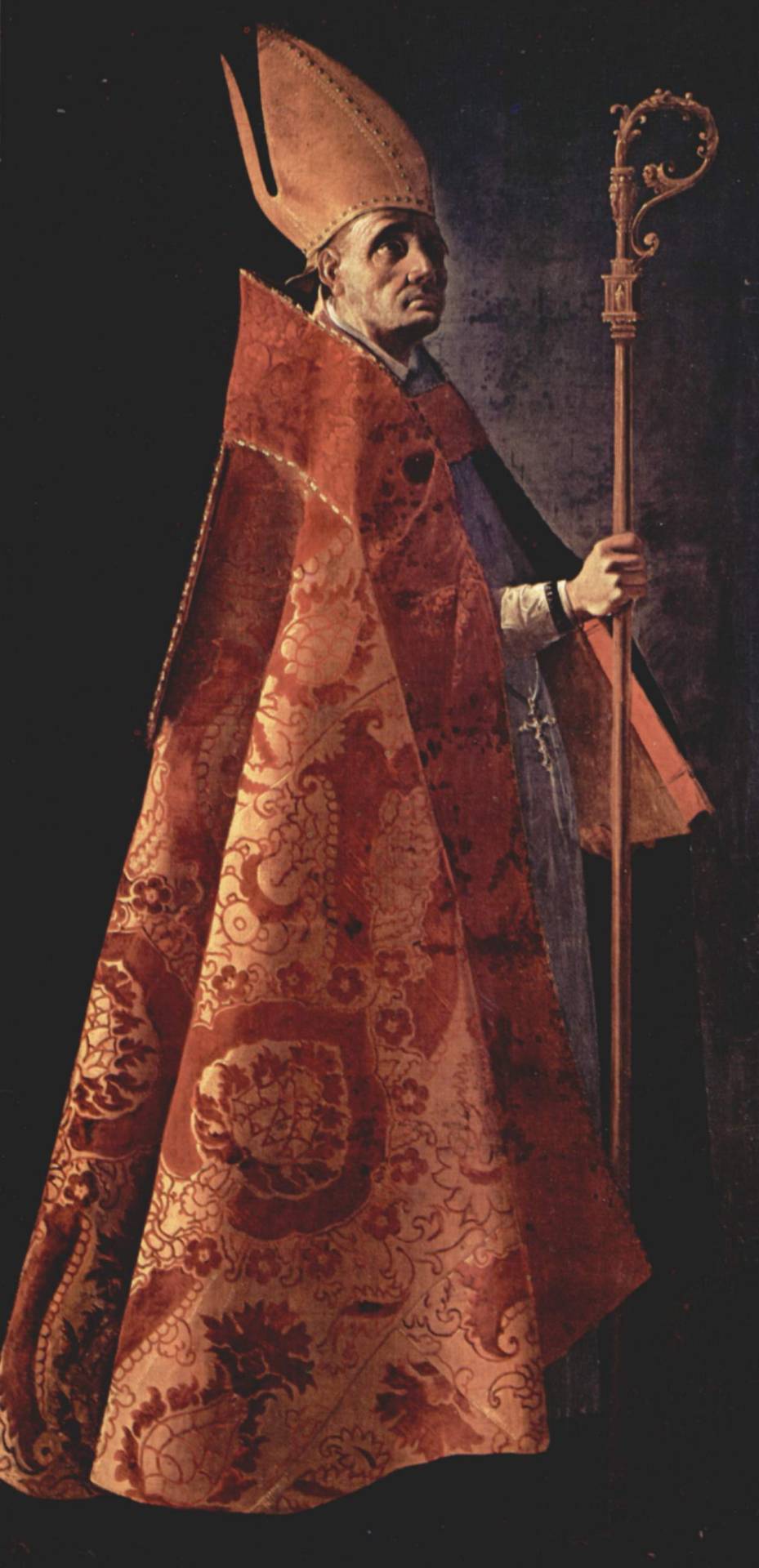
St. Ambrose, Francisco de Zurbarán, 1626-27
#art#art history#Zurbaran#Francisco de Zurbaran#portrait#portrait painting#historical portrait#imaginary portrait#St. Ambrose#Ambrose of Milan#religious art#Christian art#Christianity#Catholicism#Roman Catholicism#Baroque#Baroque art#Spanish Baroque#Tenebrism#Caravaggism#Caravaggisti#Spanish art#17th century art#Museo de Bellas Artes de Sevilla
92 notes
·
View notes
Text
Today's St. Ambrose, patron of Milan, and as per tradition is also the day on which La Scala's season opens.

Double Duck - Prima della Prima (2008)
Originally called "Nuovo Regio Ducal Teatro Alla Scala" (New Royal Ducal Alla Scala Theatre), it was inaugurated on 3rd August 1778 after the old Ducal Theatre was completely destroyed by a fire. To make space for the new building, the church of Santa Maria alla Scala was demolished and the new theatre built in its place (hence the name).
Alla Scala Theatre is the main italian opera theatre and one of the most illustrious in the world.

Topolino #2767 cover
For many years now, the season opening of La Scala is broadcasted live on national tv main channel (yes, we get 3 hours non stop opera on the state tv channel 1... so what?), this year's gonna be "Boris Godunov"... and I've gotta go 'cause it's starting!!! :D

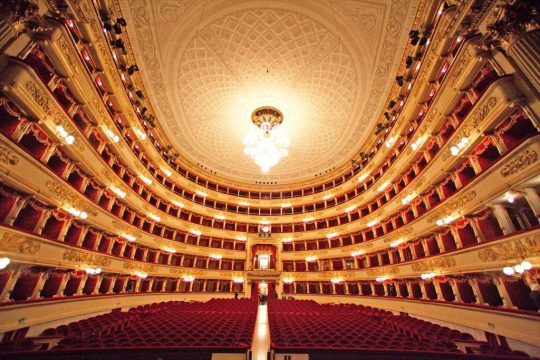
#la scala#prima#la scala seaso opening#donald duck#double duck#milan#st. ambrose#la scala theatre#topolino magazine#boris godunov
21 notes
·
View notes
Text

St Ambrose barring Theodosius from Milan Cathedral
by Anthony van Dyck
The painting depicts the Roman emperor Theodosius I and his entourage being barred from Milan Cathedral by its archbishop Saint Ambrose, as punishment for the Massacre of Thessalonica
#baroque#history#art#painting#st ambrose#saint ambrose#theodosius#milan#cathedral#anthony van dyck#roman emperor#roman#emperor#theodosius i#archbishop#massacre#thessaloniki#thessalonica#massacre of thessalonica#architecture#europe#european#national gallery#london
42 notes
·
View notes
Text

#traditional catholicism#traditional catholic images#traditional catholic renaissance religious art#traditional catholic father's and doctors of the church#traditional catholic saints#traditional catholic saints images#st. ambrose of milan#traditional catholic saints quotes
5 notes
·
View notes
Text
Happy Feast of Saint Ambrose!

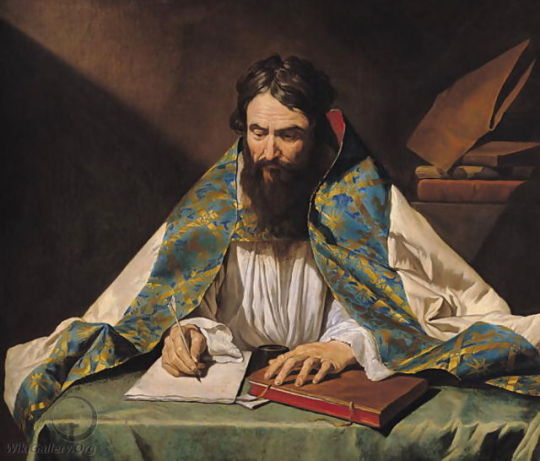
COME, Redeemer of the earth,
and manifest thy virgin-birth.
Let every age in wonder fall:
such birth befits the God of all.
Begotten of no human will
but of the Spirit, Thou art still
the Word of God in flesh arrayed,
the promised fruit to man displayed.
The Virgin’s womb that burden gained,
its virgin honor still unstained.
The banners there of virtue glow;
God in his temple dwells below.
Proceeding from His chamber free
that royal home of purity
a giant in twofold substance one,
rejoicing now His course to run.
O equal to the Father, Thou!
gird on Thy fleshly mantle now;
the weakness of our mortal state
with deathless might invigorate.
Thy cradle here shall glitter bright,
and darkness breathe a newer light
where endless faith shall shine serene
and twilight never intervene.
All praise, eternal Son, to Thee,
whose advent sets Thy people free,
whom, with the Father, we adore,
and Holy Ghost, for evermore. Amen.
-- St. Ambrose's Advent hymn on the Incarnation, as recorded by his student, St. Augustine.
5 notes
·
View notes
Text
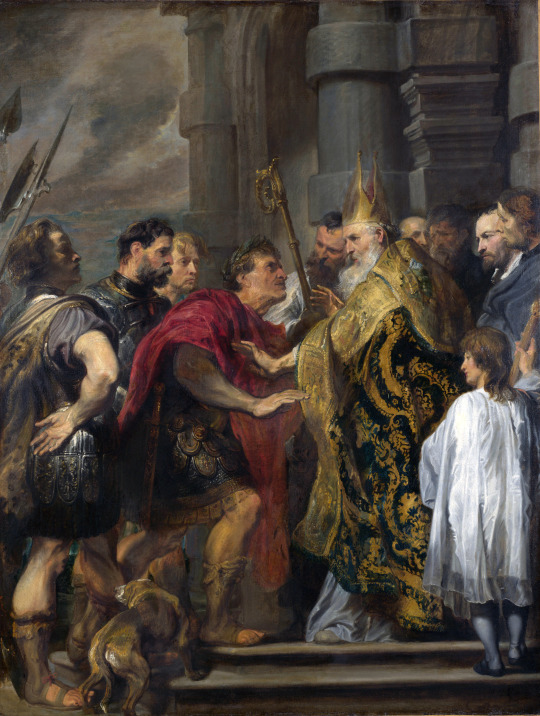
Emperor Theodosius Forbidden by St Ambrose To Enter Milan Cathedral by Anthony van Dyck (1599 - 1641)
387 notes
·
View notes
Text

Saint Ambrose
Doctor of the Church
337-397
Feast day: December 7
Patronage: Beekeeping
Saint Ambrose, an early “Father” and Doctor of the Church, was an educated lawyer and a Roman governor of Milan, with wealth and prestige. In 374 he was elected Bishop by popular demand, even though he was just a catechumen. From that point on he gave his wealth to the poor and for ransom. He learned theology and scripture from St. Simplican. At one point, he even excommunicated the Emperor Theodosius. He fought the Arian heresy and pursued sanctity throughout his life. St. Augustine’s conversion is attributed to St. Ambrose’s reasoning and logic.
Prints, plaques & holy cards available for purchase here: (website)
64 notes
·
View notes
Note
do you know of prayers to decrease suicide ideation? And can you please pray my stomach churns i am in so much distress. (I love your blog, god bless you) <33333
May God bless you and comfort you, and thank you for the kind words! I will definitely keep you in my prayers.
One thing I would recommend is reading the Psalms, and finding one that really resonates with you and including that into your prayer routine. Or if you don't have a prayer routine already, then praying this Psalm morning and night (and whenever else you need it through the day). It doesn't explicitly have to be about depression, a lot of the Psalms talk about placing their hope in the Lord even through the distress and suffering they're experiencing - and something like this might really resonate with you and comfort you.
You can find a collection of four prayers that are related to depression, anxiety, and suffering here, which should be of some help to you: https://www.sthermansoca.org/resources/prayers-against-fear/
Then there is also:
Prayer against Depression: Prayer to the Mother of God
Prayer to the Theotokos for Healing
Prayer to the Mother of God in a Time of Distress
Akathist to St. Xenia of St. Petersburg
Prayer of Someone in Trouble
Prayer of Saint John Chrysostom
Prayer to St. John of Shanghai and San Francisco
Healing Prayer of Saint Ambrose of Milan
Guardian Angel Prayers for Protection
Prayer of St. Dimitri of Rostov
Prayer for the Self
Prayers don't have to explicitly be about depression or liberation from despair in order to be helpful. Find prayers that really resonate with you, and ones that you are willing and able to pray. Try to read even one Psalm a day as well as a prayer that you find helpful.
Speak often to God about your difficulties and struggles also. Sometimes the best prayers are the ones that we come up with, because they most accurately reflect our situation, our wants, our needs, and so on. We don't need to know the perfect things to say. But the act of praying about our issues, of articulating them and putting them into words and placing them before God can be of immense help and comfort to us. And the act of articulating problems out loud can go a long way to untangling them in our head which can help us feel even a little less overwhelmed.
God bless you!
46 notes
·
View notes
Note
What are the reasons you think everyone should become Orthodox Christian? I grew up an atheist bc it was popular and morally correct during my teenage years to be an atheist, liberal, sex positive, scientific, etc, so that was my identity. I no longer feel connected to most of the views I used have and I personally like to live celibate and sober. I have never practiced religion and have no personal concept of "god," though I have been drawn to learning about others religious beliefs lately. I have followed different kinds of religious/spiritual blogs and like reading about what faith adds to their life.
In your short ask, you have mentioned how the reason (or part of the reason) you became an atheist was because of how unfashionable it was to believe in God while you were growing up. It was popular and politically correct to be a liberal, sex positive, “scientific” atheist.
Your reason for becoming an atheist was your desire to please your peers; your longing to have friends who accepted you, not for who you are, but for the sacrifice you made when you set your morals aside to follow the same ideologies that they follow.
I did the same thing. I was the lost sheep, the prodigal son, I strayed from the faith because I sought the companionship of other people. Why did we do that? I did that because I was wounded in my heart, I had felt abandoned by God. I was hurt and I sought consolation from the world. I found distractions from the pain but I did not find healing.
When I returned to God, when my friends left me, when youth had departed from me, when the drugs wore off, when the money ran out, when all the distractions left me destitute of emotions and the will to live, I saw how false the world’s promises are. I realized that it was not God who left me but I left God to follow my own will, like a petulant child.
The only medicine for our souls is love, not temporal emotional love but permanent longsuffering love that only comes from God. There is no short way to describe what love is, but if you want to know, I encourage you to read the Bible, to pray, to go to Church, and you will find what you are looking for; or rather, He will find you.
St. Ambrose of Milan said, “Just as in Paradise, God walks in the Holy Scriptures seeking man.”
It’s true. He is waiting for you.
You are also welcome to message me. You are not alone in your search for the meaning of life.
May the mercies of God be with you, my dear friend.
23 notes
·
View notes
Photo

(Via Gebre Menfes Kidus)
7 notes
·
View notes
Text
"Nature has poured forth all things for the common use of all men. And God has ordained that all things should be produced that there might be food in common for all. Nature created common rights, but usurpation has transformed them into private rights."
St. Ambrose of Milan | On the Duties of the Clergy, Book I.132.
227 notes
·
View notes
Text
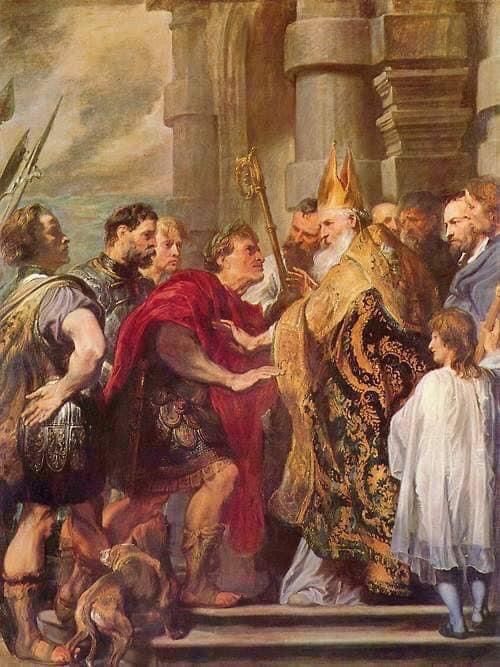
Emperor Theodosius Forbidden by St Ambrose To Enter Milan Cathedral by Anthonis van Dyck
"His zeal in rebuking and bringing to penance the great Emperor Theodosius, who in a moment of irritation had cruelly punished a sedition by the inhabitants of Thessalonica, is a well known fact of history. The Saint met him at the door of the cathedral to prevent his entering, and said to him that if he had imitated David in his crime, he must now imitate him in his penance. Later the chastened and humble Emperor said that in his life he had known but one true bishop — Ambrose."
34 notes
·
View notes
Text
Saint of the Day – 24 December – Saint Delphinus of Bordeaux (Died 403) Bishop
Saint of the Day – 24 December – Saint Delphinus of Bordeaux (Died 403) the 2nd Bishop of Bordeaux, Defender of the True Faith, friend of St Ambrose and St Venerius of Milan. He was also instrumental in the conversion of the great St Paulinus of Nola, becoming his spiritual father and teacher. Also known as – Delfinus, Delphin.
We know little about his origins and early career but in 380 he…
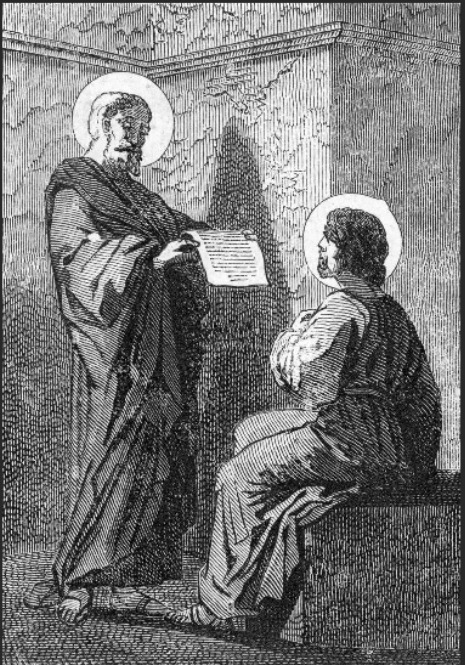
View On WordPress
5 notes
·
View notes
Text
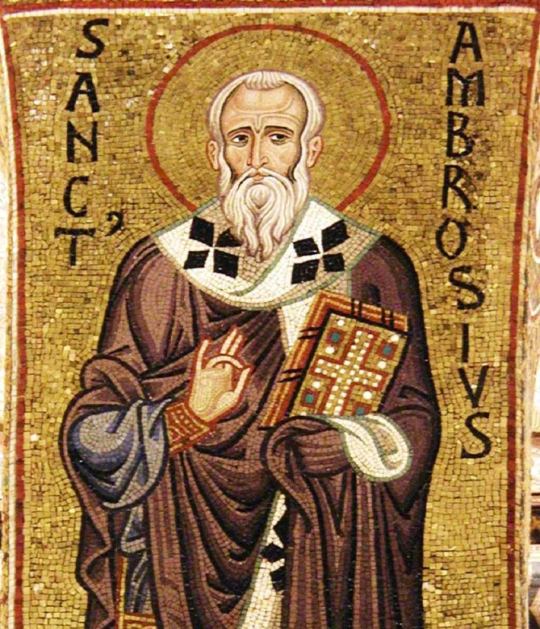
Non de tuo largiris pauperi sed de suo reddis. Quod enim commune est in omnium usum datum, tu solus usurpas. Omnium est terra, non divitum
You are not making a gift of what is yours to the poor man, but you are giving him back what is his. You have been appropriating things that are meant to be for the common use of everyone. The earth belongs to everyone, not to the rich.
—St Ambrose of Milan (Aurelius Ambrosius), De Nabuthæ, cap. xii, n. 53 (389 CE)
[Robert Scott Horton]
4 notes
·
View notes
Text
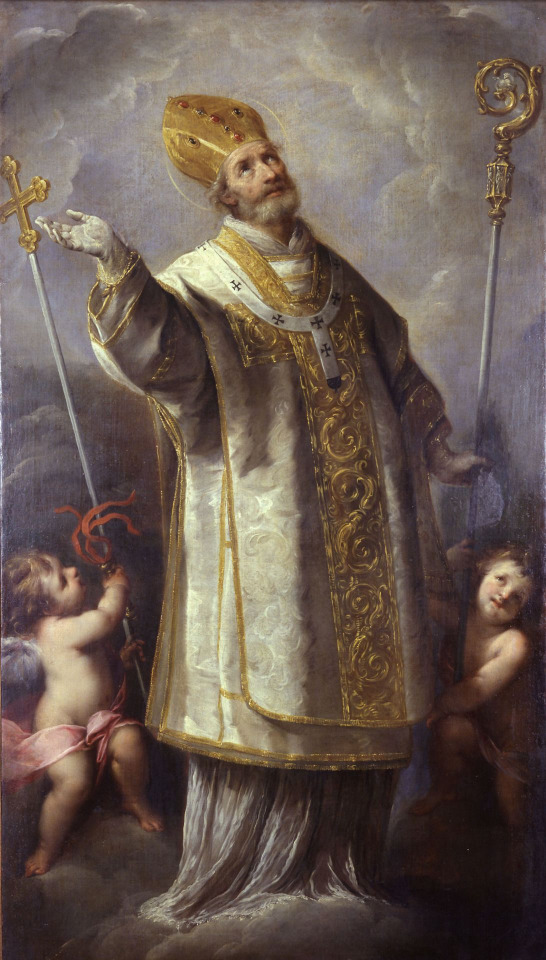
THE DESCRIPTION OF SAINT AMBROSE OF MILAN
Feast Day: December 7
"It is preferable to have a virgin mind than a virgin body. Each is good if each be possible; if it be not possible, let me be chaste, not to man but to God."
Like Augustine himself, the older Ambrose, born around 340, was a highly educated man who sought to harmonize Greek and Roman intellectual culture with the Catholic faith. Trained in literature, law, and rhetoric, he eventually became the governor of Liguria and Emilia, with headquarters at Milan. He manifested his intellectual gifts in defense of Christian doctrine even before his baptism.
While Ambrose was serving as governor, a bishop named Auxentius was leading the diocese. Although he was an excellent public speaker with a forceful personality, Auxentius also followed the heresy of Arius, which denied the divinity of Christ. Although the Council of Nicaea had reasserted the traditional teaching on Jesus' deity, many educated members of the Church – including, at one time, a majority of the world's bishops – looked to Arianism as a more sophisticated and cosmopolitan version of Christianity. Bishop Auxentius became notorious for forcing clergy throughout the region to accept Arian creeds.
At the time of Auxentius' death, Ambrose had not yet even been baptized. But his deep understanding and love of the traditional faith were already clear to the faithful of Milan. They considered him the most logical choice to succeed Auxentius, even though he was still just a catechumen. With the help of Emperor Valentinan II, who ruled the Western Roman Empire at the time, a mob of Milanese Catholics virtually forced Ambrose to become their bishop against his own will. Eight days after his baptism, Ambrose received episcopal consecration on Dec. 7, 374. The date would eventually become his liturgical feast.
Bishop Ambrose did not disappoint those who had clamored for his appointment and consecration. He began his ministry by giving everything he owned to the poor and to the Church. He looked to the writings of Greek theologians like St. Basil for help in explaining the Church's traditional teachings to the people during times of doctrinal confusion. Like the fathers of the Eastern Church, Ambrose drew from the intellectual reserves of pre-Christian philosophy and literature to make the faith more comprehensible to his hearers. This harmony of faith with other sources of knowledge served to attract, among others, the young professor Aurelius Augustinus – a man Ambrose taught and baptized, whom history knows as St. Augustine of Hippo.
Ambrose himself lived simply, wrote prolifically, and celebrated Mass each day. He found time to counsel an amazing range of public officials, pagan inquirers, confused Catholics and penitent sinners. His popularity, in fact, served to keep at bay those who would have preferred to force him from the diocese, including the Western Empress Justina and a group of her advisers, who sought to rid the West of adherence to the Nicene Creed, pushing instead for strict Arianism. Ambrose heroically refused her attempts to impose heretical bishops in Italy, along with her efforts to seize churches in the name of Arianism. Ambrose also displayed remarkable courage when he publicly denied communion to the Emperor Theodosius, who had ordered the massacre of 7,000 citizens in Thessalonica leading to his excommunication by Ambrose. The chastened emperor took Ambrose's rebuke to heart, publicly repenting of the massacre and doing penance for the murders. "Nor was there afterwards a day on which he did not grieve for his mistake," Ambrose himself noted when he spoke at the emperor's funeral.
The rebuke spurred a profound change in Emperor Theodosius. He reconciled himself with the Church and the bishop, who attended to the emperor on his deathbed. St. Ambrose died in 397. His 23 years of diligent service had turned a deeply troubled diocese into an exemplary outpost for the faith. His writings remained an important point of reference for the Church, well into the medieval era and beyond. St. Ambrose has been named one of the 'holy fathers' of the Church, whose teaching all bishops should 'in every way follow.'
Ambrose joins Augustine, Jerome, and Gregory the Great as one of the Latin Doctors of the Church.
#random stuff#catholic#catholic saints#ambrose of milan#san ambrocio#saint ambrose#beekeepers#candlemakers#doctor of the church
2 notes
·
View notes